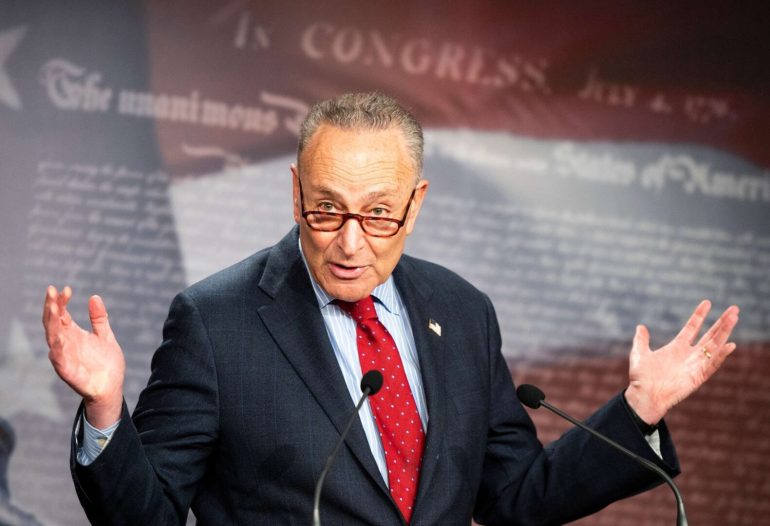- Schumer-led bipartisan group unveils AI regulatory roadmap.
- Plan emphasizes billions in funding for AI research and development.
- Addresses AI’s impact on defense, healthcare, and workforce.
- Calls for sector-specific regulations and transparency measures.
- Aims to ensure U.S. military competitiveness in AI.
- Reflects bipartisan support but faces challenges in legislative enactment.
- Tech companies continue AI advancements despite regulatory push.
- Includes provisions for existing bipartisan bills like the Create AI Act.
- Schumer emphasizes proactive role of congressional committees in implementation.
- Result of extensive deliberations involving policymakers and industry leaders.
Main AI News:
Schumer’s eagerly anticipated AI ‘road map’ is set to be revealed this week, with a projected cost in the billions. Spearheaded by a bipartisan cohort of senators led by Majority Leader Charles E. Schumer, this initiative is poised to chart the course for regulating artificial intelligence, steering Congress toward allocating significant funds for its research and development while mitigating potential risks.
This comprehensive roadmap, slated for release almost a year after Schumer’s call for urgent AI regulation, serves as a strategic guidepost for Senate committees engaged in drafting legislation concerning AI. With insights gleaned from individuals briefed on the plan, it navigates a wide array of concerns spanning AI’s impact on defense, healthcare, workforce dynamics, and more. The plan’s anticipated unveiling, likely to occur this Tuesday, signals a pivotal moment in AI governance.
“The road map is in its final stages and will soon be unveiled,” states Schumer spokeswoman Allison Biasotti, underscoring the imminent release of the plan. Initial estimates suggest a budget allocation of around $32 billion for AI research and development, echoing recommendations from the 2021 National Security Commission on Artificial Intelligence.
Moreover, the roadmap advocates for sector-specific regulations, emphasizing tailored guidelines for industries like healthcare. It also prioritizes the establishment of testing protocols and transparency measures to elucidate the potential hazards associated with AI deployment. Notably, provisions aimed at maintaining U.S. military competitiveness in AI and monitoring adversaries’ advancements are integral components of the plan.
In light of the United States’ lag in AI regulatory frameworks compared to other global counterparts, this roadmap is poised to catalyze legislative momentum within Congress. Despite bipartisan support, doubts persist regarding Congress’s ability to enact comprehensive AI legislation amidst heightened political tensions.
Meanwhile, domestic tech entities are forging ahead with AI innovations, exemplified by OpenAI’s recent enhancements to ChatGPT and Google’s forthcoming AI-related announcements at its developer conference.
Schumer, alongside a bipartisan coalition of senators dubbed the “AI Gang,” underscores the urgency of establishing guardrails for AI advancement. Their proposed measures encompass the passage of existing bipartisan bills, such as the Create AI Act, alongside initiatives aimed at workforce training and development to address concerns surrounding job displacement.
During a recent interview at the AI Expo for National Competitiveness, Schumer hinted at the plan’s imminent release, emphasizing the proactive role of congressional committees in implementing its recommendations. He underscores the need for swift, targeted actions across various committees to address the multifaceted challenges posed by AI.
Schumer’s roadmap reflects extensive deliberations among policymakers, tech leaders, and other stakeholders, facilitated through a series of “insight forums.” These engagements, including a notable six-hour session featuring industry titans like Elon Musk and Mark Zuckerberg, underscore the collaborative approach taken in shaping AI governance strategies.
Conclusion:
Schumer’s unveiling of the AI regulation roadmap underscores a significant step towards shaping the AI governance landscape. The roadmap’s emphasis on funding, sector-specific regulations, and bipartisan collaboration signals a proactive approach to addressing AI’s challenges and opportunities. For the market, this signifies a growing awareness of the need for regulatory frameworks to harness AI’s potential while mitigating risks, potentially leading to increased investment in AI-related sectors and a more structured approach to innovation and deployment.

